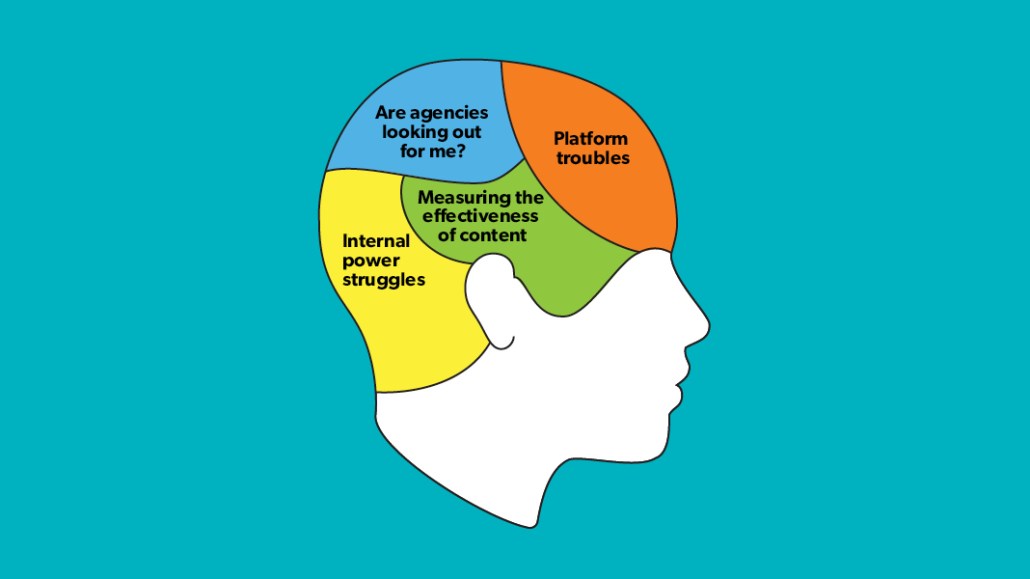Last chance to save on Digiday Publishing Summit passes is February 9
OH at the Digiday Brand Summit: ‘We have a power struggle’

This week, in Charleston, South Carolina, Digiday gathered together executives from top brands to discuss the challenges they face in building brands in a new digital age.
We held meetings — to address internal issues, platform relationships, agencies and measurement — under Chatham House rules, agreeing that all discussions be on the record, only without attribution of names and companies. What follows are the candid thoughts these leaders shared during the first day of meetings.
Internal work culture
“We had a ton of agencies trying to sell us on how they should come work with us, inside our offices, mashed with the rest of our team. It does not work. It was just a power play.”
“We have a power struggle. Our company is very sales- and product-driven. So power lies within those departments. Marketing is not very empowered.”
“I think my CMO is most interested in preserving his job, rather than doing the right thing for the business.”
““I don’t have a digital-first CEO. I deal with lots of pushback as I’m the only digital person in a company that has over 2,000 people. Channels, agency resources and tools are not consistent.”
Platforms: Friends or foe?
“Facebook has essentially hinted to us that if we create content good enough to share, they won’t force us to pay for other content that we want to boost. Do a good job in one area, and you’re set.”
“Who here has a Facebook rep? We should all get a drink later. I want to know what strategies they’re all selling all of us on. It’s all different.”
“Platforms don’t care about small brands. That’s a fact. I haven’t seen my rep, ever. We’re cut off.”
“Facebook is the most helpful. They care a lot about actual brand success. They’re at an advantage because they don’t have to worry about money. The rest, they’re no good.”
“I personally think good platform reps are ones who do right by the client and not just right by the company.”
“Facebook is all pay to play. So service levels differ by tier. That’s why we’re married to YouTube. If you have good content, it works. The algorithm will serve it up. That’s it.”
“All the metrics mess really made us bring down our spend on Facebook. We moved it all to YouTube. Then we found out there’s porn there.”
External relationships
“Agencies always want to try and sell us on some big idea. They need to just move our product.”
“A brand may have a social agency, a search agency, a digital agency and a media agency, etc. It is hard to get everyone to march together. Agency A might be resentful that agency B has got more marketing budget from the brand, and think it would do a better job if it could do it all. But when you work with a one-stop shop, you get average work most of the time.”
“Finger pointing is the biggest challenge for us. Agencies and vendors are battling against each other, and I don’t know whose fault it is. I just want to get the work done. For instance, when we integrated a new tool recently, our agencies said that our vendors’ coding was wrong while our vendors said that our agencies made the mistake. It took ages for us to finish the integration.”
“My parent company probably has hundreds of external agencies — it is outsourcing too much. It is paying lots of agency fees and getting little service in return. And there’s a trickle-down effect: If an account person at one of those agencies leaves, chances are the agency will review all the vendor relationships when a new person joins, so we need to do everything all over again.”
Contributing: Yuyu Chen
More in Marketing

Star power, AI jabs and Free Bird: Digiday’s guide to what was in and out at the Super Bowl
This year’s Big Game saw established brands lean heavily on star power, patriotic iconography and the occasional needle drop.

In Q1, marketers pivot to spending backed by AI and measurement
Q1 budget shifts reflect marketers’ growing focus on data, AI, measurement and where branding actually pays off.

GLP-1 draws pharma advertisers to double down on the Super Bowl
Could this be the last year Novo Nordisk, Boehringer Ingelheim, Hims & Hers, Novartis, Ro, and Lilly all run spots during the Big Game?








